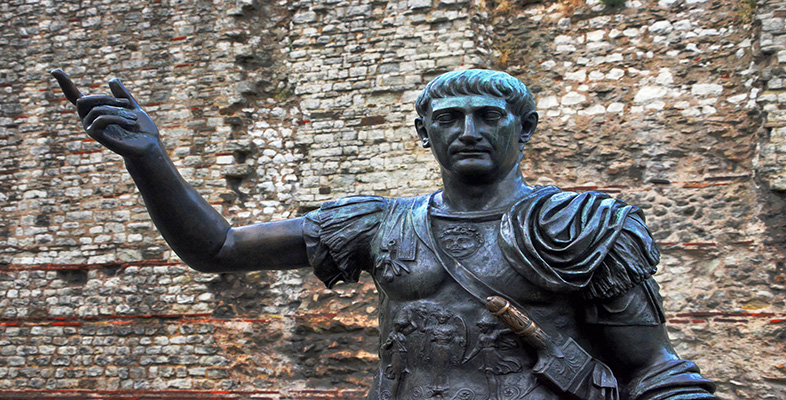2.3 Intermediaries
The emperor could not be in all places at once, and he employed subordinates and representatives in the provinces to act on his behalf.
Exercise 2
You should now read Goodman, pages 100–4 and 107–10, below. This will provide you with an overview of how the provinces were administered.
What did the emperor expect of his representatives and how did he achieve this?
Please click to read the Goodman extract [Tip: hold Ctrl and click a link to open it in a new tab. (Hide tip)] . (PDF, 9 pages, 0.6 MB)
Discussion
You were probably struck by the flexibility of the system. ‘No one, not even Augustus, seems ever to have produced an overall strategy for provincial administration’ (Goodman, p. 100). There were set offices such as governors appointed either by the senate or the emperor, legionary commanders and procurators who collected taxes. However, the emperor could and often did employ his own private agents to resolve difficulties. Goodman's discussion highlights certain objectives for these officials. In particular the financial relationship between the emperor and the provinces is described in detail; it was a primary role of intermediaries such as governors to ensure that the taxes were collected. For this to occur the provinces needed to be well ordered; thus the administration of justice and the supervision and command of the army were also entrusted to suitable subordinates. The source of administrative and military officials was in general, although not exclusively, the élite of Rome, especially those drawn from the equestrian and senatorial orders. Simultaneously local élites were encouraged to maintain a level of autonomy in their towns and cities and this helped to minimise the number of officials. It was through this élite that the provincials had contact with the sources of power in the Roman empire. One major concern in using intermediaries was that individuals might accumulate too much personal power. This was overcome by the short tenure attached to most posts and the idea that important issues should always be referred back to the centre. Disloyalty to the emperor was thus rare but certainly not unheard of.
It is difficult to judge the degree to which individual emperors took an active interest in the details of provincial administration. Many may have been content to allow their subordinates to monitor affairs, only interfering when a crisis arose. But the correspondence between the emperor Trajan and the governor of Bithynia, Pliny the Younger, illustrates the emperor's advisory role on many matters concerning the day-to-day running of the province. (For examples look up Pliny the Younger in the index of Lewis and Reinhold.) We do not know how representative Trajan and specifically his relationship with Pliny was, but the correspondence at the very least illustrates one of the avenues by which the provincials could gain the ear of the emperor. (For further discussion of correspondence and communication between the emperor and his officials refer to Experiencing Rome, Essay Two, pp. 37–41.) You should also note that informal intermediaries could be important. People who knew and met the emperor, both in official and unofficial contexts, could serve as points of contact between the emperor and local communities. In particular, towns and cities sought patrons – wealthy and influential men who could represent their interests in Rome (for examples of patrons see Lewis and Reinhold, pp. 45, 262, 271–4). Members of the imperial family could be particularly powerful patrons and the ultimate patron was the emperor himself.
